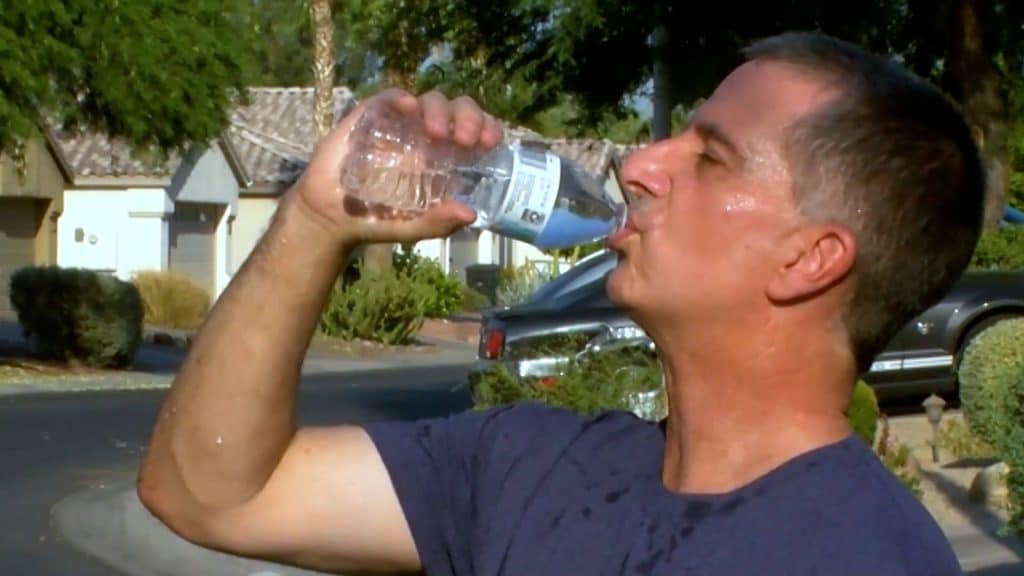Diagnosis
Your doctor can often diagnose dehydration on the basis of physical signs and symptoms. If you're dehydrated, you're also likely to have low blood pressure, especially when moving from a lying to a standing position, a faster than normal heart rate and reduced blood flow to your extremities.
To help confirm the diagnosis and pinpoint the degree of dehydration, you may have other tests, such as:
- Blood tests. Blood samples may be used to check for a number of factors, such as the levels of your electrolytes — especially sodium and potassium — and how well your kidneys are working.
- Urinalysis. Tests done on your urine can help show whether you're dehydrated and to what degree. They also can check for signs of a bladder infection.
Treatment
The only effective treatment for dehydration is to replace lost fluids and lost electrolytes. The best approach to dehydration treatment depends on age, the severity of dehydration and its cause.
For infants and children who have become dehydrated from diarrhea, vomiting or fever, use an over-the-counter oral rehydration solution. These solutions contain water and salts in specific proportions to replenish both fluids and electrolytes.
Start with about a teaspoon (5 milliliters) every one to five minutes and increase as tolerated. It may be easier to use a syringe for very young children. Older children can be given diluted sports drinks. Use 1 part sports drink to 1 part water.
Most adults with mild to moderate dehydration from diarrhea, vomiting or fever can improve their condition by drinking more water or other liquids. Diarrhea may be worsened by full-strength fruit juice and soft drinks.
If you work or exercise outdoors during hot or humid weather, cool water is your best bet. Sports drinks containing electrolytes and a carbohydrate solution also may be helpful.
Children and adults who are severely dehydrated should be treated by emergency personnel arriving in an ambulance or in a hospital emergency room. Salts and fluids delivered through a vein (intravenously) are absorbed quickly and speed recovery.
Preparing for your appointment
You're likely to start by seeing your or your child's doctor. However, in some cases when you call to set up an appointment, the doctor may recommend urgent medical care. If you, your child or an adult who you care for is showing signs of severe dehydration, such as lethargy or reduced responsiveness, seek immediate care at a hospital.
If you have time to prepare for your appointment, here's some information to help you get ready, and what to expect from the doctor.
What you can do
- Write down any symptoms you or the person you're caring for is experiencing, including any that may seem unrelated to the reason for which you scheduled the appointment. If you or the person you're caring for has been vomiting or has had diarrhea, the doctor will want to know when it began and how frequently it's been occurring.
- Write down key personal information, including any recent trips taken or foods recently eaten that might have caused illness. In addition, your doctor will want to know if you or the person you're caring for has recently been exposed to anyone with diarrhea.
- Make a list of key medical information, including other conditions you or the person you're caring for is being treated for and the names of the medications being taken. Include on your list prescription and over-the-counter drugs, as well as any vitamins and supplements.
- Write down questions to ask your doctor.
For dehydration, some basic questions to ask the doctor include:
- What's causing these symptoms?
- What kinds of tests are needed?
- What treatment do you recommend?
- How soon after treatment will there be improvement?
- Are there any activity or dietary restrictions?
- Is there anything I can do to prevent a recurrence of dehydration?
- I have other health conditions. Do I need to change the treatments I've been using for them?
- What steps can I take to prevent dehydration from happening again?
What to expect from your doctor
Your doctor is likely to ask you a number of questions, such as:
- When did the symptoms begin? What were you doing?
- Are you able to keep down any food or drink?
- How recently have you urinated? Are you experiencing any pain or urgency with urination?
- Do you also have other signs or symptoms, such as abdominal cramping, fever, headache or muscle aches? How severe are these signs and symptoms?
- Has there been blood in your stools?
- Have you recently eaten any food that you suspect was spoiled?
- Has anyone gotten sick after eating the same food that you did?
- Have you recently been exposed to someone who you know was experiencing diarrhea?
- Have you been coughing or had a runny nose?
- What medications are you currently taking?
- Have you recently traveled to another country?
- Do you know what your or your child's weight was before symptoms started?
